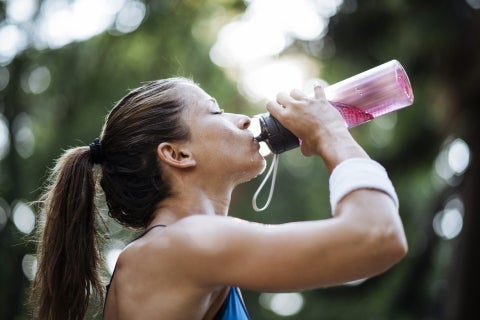
Summer is here and in Oklahoma that means it’s going to get hot! However, don’t use that as an excuse to take a break from exercise. Just remember to use good judgment and listen to your body when you’re outdoors. Here are a few tips to help you stay safe and active during those summer months whether you’re camping, hiking, swimming or biking!
• Hydrate, Hydrate, Hydrate - Make sure you’re staying hydrated by drinking plenty of fluids before, during and after exercise. If you’re waiting until you feel thirsty, you’re already behind the curve on hydration and need to start consuming fluids as soon as possible.
• During your first hot weather workout, cut back on your exercise duration (time) and intensity. It can go from 85 degrees to 58 degrees within a day here, so if it’s your first time to exercise in the heat, take it easy and get adjusted to the temperature before you really start to push those workouts.
• Dress accordingly and wear sunscreen! Wearing moisture-wicking materials and light-colored clothing can be a great way to help your sweat evaporate from your skin and keep you feeling cool. Don’t forget sunscreen to protect those exposed areas from the sun. An SPF rating of 30 – 45 is recommended for sun protection.
• Avoid exercising at the hottest times of the day and consider moving your workouts indoors. However, if you must go outside, aim for early morning or evening workouts and pick routes or areas that provide lots of shade. Shaded trails or paths will keep your sun exposure to a minimum and can decrease temperatures by 10 degrees but can also increase your exposure to pesky bugs. If you choose trails or other paths like that make sure to apply some type of bug spray to keep ticks, chiggers and mosquitoes at bay.
• Go swimming - Cool off and take your workout to the lake or your local pool. Swimming is a great cardiovascular and total body workout. If it’s your first time to swim in a while start slow, go slow and remember to stay hydrated. Just because you’re in the water doesn’t mean you’re not sweating and losing fluids, so hydration is just as important in the water as out of the water.
Above all, pay attention to what your body is telling you and know the symptoms of heat-related stress: nausea, dizziness, headache, chills, muscle cramps, extreme breathlessness and/or a reduction in your sweat rate. If you feel any of these symptoms, stop what you’re doing, get cool, rehydrate and seek medical attention if necessary.
Written by Chad Stanton, certified trainer at Hillcrest Fitness Center.
